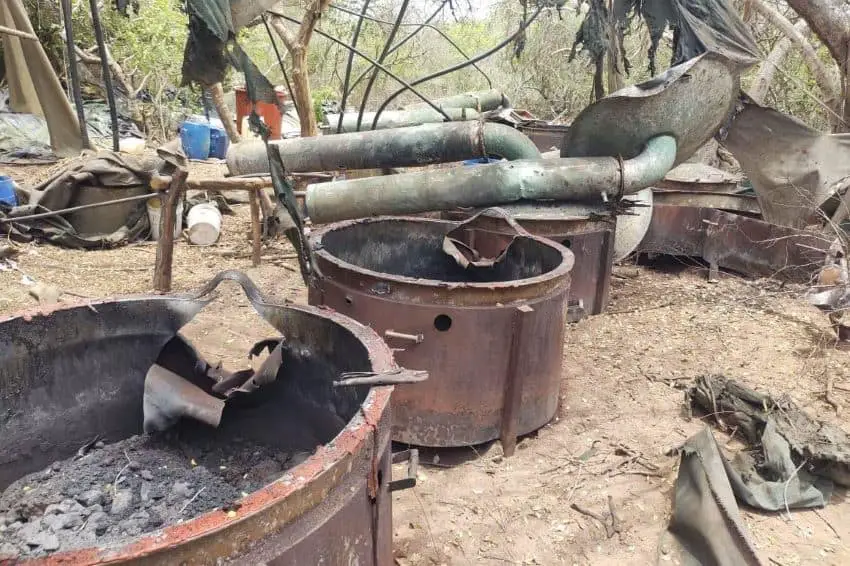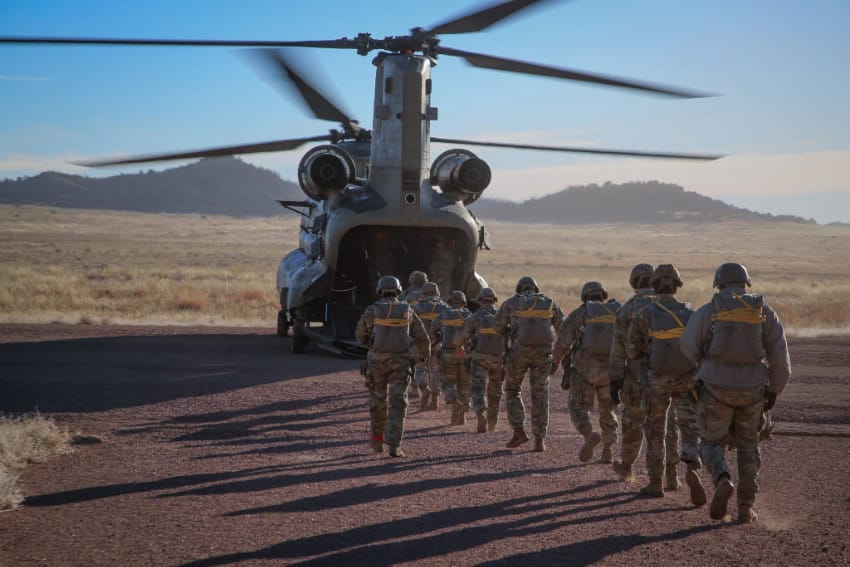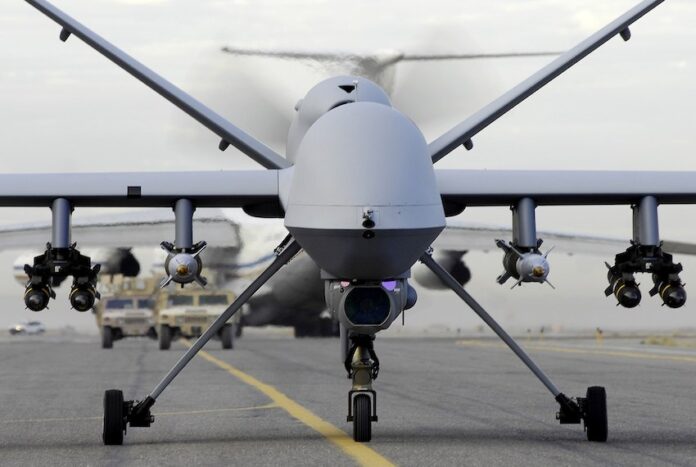The United States Central Intelligence Agency (CIA) has recently been flying drones over Mexico to spy on drug cartels and hunt for fentanyl labs, CNN and The New York Times reported Tuesday.
Citing unnamed current and former U.S. officials familiar with the missions, CNN reported that the CIA has covertly flown MQ-9 Reaper drones over Mexico to spy on cartels since U.S. President Donald Trump took office on Jan. 20.
New: The CIA has been covertly flying MQ-9 Reaper drones over Mexico to spy on drug cartels, current and former officials familiar with the matter told CNN, part of Trump’s shift to treat cartels like terror orgs. From @NatashaBertrand @ZcohenCNN and me: https://t.co/p16Fj42VEg
— Katie Bo Lillis (@KatieBoLillis) February 18, 2025
Also citing unnamed U.S. officials, The New York Times said that the Trump administration “has stepped up secret drone flights over Mexico to hunt for fentanyl labs.”
The Times said that the covert drone program began during Joe Biden’s presidency.
Citing one of its sources, CNN said that the recent drone flights in Mexico “were communicated to Congress by the Trump administration using a particular notification reserved for new or updated covert programs that the CIA intends either to conceal or deny… suggesting that the flights represent a distinct escalation.”
CNN said that the drones used for the missions in Mexico are not currently armed, but noted that “they can be equipped with payloads to carry out precision strikes.”

“The U.S. regularly uses them to target suspected terrorists in Syria, Iraq and Somalia,” the news organization added.
Officials who spoke with the NYT said the CIA has not been authorized to use the drones to take lethal action in Mexico. The Times’ sources said they do not see the drones being used to carry out airstrikes against cartel targets in Mexico.
“Conducting an airstrike on fentanyl labs would probably cause catastrophic fatalities, as they are often inside homes in urban areas, a person familiar with the program said, most likely contributing to the reluctance to authorize lethal force,” the Times said.
The NYT said that “for now, CIA officers in Mexico pass information collected by the drones to Mexican officials.”
For its part, CNN reported that “some current and former officials say designating cartels as terrorist groups could potentially lay the groundwork for direct U.S. strikes against the cartels and their drug labs in Mexico.”
The Trump administration’s designation of six Mexican cartels as foreign terrorist organizations is “imminent,” the NYT reported last week.
The reports on the drone missions come 8 days after CNN reported that the U.S. military had “significantly increased its surveillance of Mexican drug cartels over the past two weeks, with sophisticated spy planes flying at least 18 missions over the southwestern U.S. and in international airspace around the Baja peninsula.”
While the U.S. spy planes didn’t enter Mexican airspace, the drone flights go “well into sovereign Mexico,” one U.S. official told the NYT.
Pentagon’s 18 spy plane missions near US-Mexico border spark surveillance concerns
CNN also reported that the MQ-9 Reapers “are being flown inside Mexican airspace.”
The Times said that the drones have proved to be “adept” at identifying clandestine drug labs.
“Fentanyl labs emit chemicals that make them easy to find from the air,” the newspaper reported.
If the CIA is providing information from the drone missions to the Mexican government, local security forces could subsequently shut down the drug labs they detect. Security Minister Omar García Harfuch said last Friday that the Mexican Army and Navy had dismantled six clandestine drug labs in the northern state of Sinaloa, but gave no indication that authorities had first received intelligence from the United States. The synthetic drug labs dismantled by the navy were located thanks to “naval intelligence,” García said.
At her Tuesday morning press conference, President Claudia Sheinbaum gave a somewhat cryptic one-sentence response when asked about the reported CIA drone flights over Mexico.
“It’s also part of this campañita [little campaign],” she said without elaborating.
“Es parte de esta campañita”, respondió la presidenta Claudia Sheinbaum al cuestionamiento sobre los reportes de medios estadounidenses que aseguran que la CIA ha estado volando encubiertamente drones MQ-9 Reaper sobre México para espiar a los cárteles de la droga. pic.twitter.com/OQliVthIjw
— NMás (@nmas) February 18, 2025
The implication was that the president places little faith in the reporting on U.S. drone missions over Mexico, although she didn’t reject it outright.
Sheinbaum has repeatedly stressed that Mexico is willing to collaborate on security issues with the United States, but will never accept subordination or violations of its sovereignty.
Earlier this month, Trump agreed to postpone his planned 25% tariffs on all Mexican exports to the United States after Sheinbaum committed to deploying 10,000 National Guard troops to Mexico’s northern border to stem the flow of narcotics and migrants to the U.S.
The U.S. president is particularly determined to stop the entry of fentanyl to the United States, where the synthetic opioid has fueled an overdose crisis. After signing an executive order on Jan. 20 that laid the groundwork for the designation of Mexican cartels as terrorist organizations, Trump was asked whether he would consider “ordering U.S. special forces into Mexico” to “take out” cartels.
“Could happen. Stranger things have happened,” said the president, who last year indicated he was open to using military “strikes” against Mexican cartels.
Report: CIA to take larger role in fight against Mexican cartels
Citing “people familiar with the matter,” The Washington Post reported Monday that the CIA “is poised to take a larger, more aggressive role under President Donald Trump in the battle against Mexican-based drug cartels.”
That larger role, the Post said, includes “devising and evaluating plans to share more intelligence with regional governments, train local counternarcotics units and possibly conduct other covert actions.”
The “expanded focus on cartels … represents a new and potentially risky priority for the spy agency,” the newspaper said, adding that “CIA Director John Ratcliffe intends to shift agency resources to its counternarcotics mission and apply insights from its two decades of tracking, infiltrating and disrupting terrorist networks to fighting the cartels.”

Citing people familiar with the CIA’s “emerging plan,” The Washington Post said that the emphasis will be on increased U.S. support to anti-drug forces within Mexico and elsewhere in the hemisphere.
“… Less clear is whether armed U.S. personnel, either from the military’s Special Operations forces or the CIA, could be tasked with taking direct action against cartel leaders on Mexican soil, something former intelligence and military officials warn would spark a ferocious backlash and harm U.S.-Mexican relations, including counternarcotics cooperation,” the Post said.
The El Universal newspaper reported Tuesday that it was told by a U.S. Department of Justice source that there are six different actions the U.S. government is taking or could take against Mexican drug cartels.
The six actions mentioned by the unnamed Department of Justice source were:
- Intelligence operations — such as the recent U.S. spy plane missions — and satellite surveillance.
- Collaboration with the Mexican government, including through the training of Mexican forces by U.S. military personnel.
- The creation of a multinational force against drug trafficking. “A joint task force could be created with countries affected by drug trafficking like Colombia, Guatemala and Mexico,” the source said.
- The use of drones inside Mexican territory.
- U.S. special forces operations in Mexico “in an extreme case” in which Mexico “doesn’t want to coordinate” with the United States “and hasn’t satisfied the Trump administration’s demands in the fight against fentanyl.”
- Cyber warfare against cartels and tracing of criminal organizations’ use of cryptocurrency and money laundering practices. In addition, “artificial intelligence can be used to analyze criminal patterns and put into effect applications that predict the movements of criminal leaders based on big data and satellite intelligence,” said El Universal, citing its Department of Justice source.
“The United States could employ different operational strategies in Mexican territory to locate and neutralize drug cartel leaders, using similar methods to those employed in other parts of the world such as the Middle East, Afghanistan, Central America and South America,” the source said.
With reports from CNN, The New York Times, The Washington Post and El Universal
